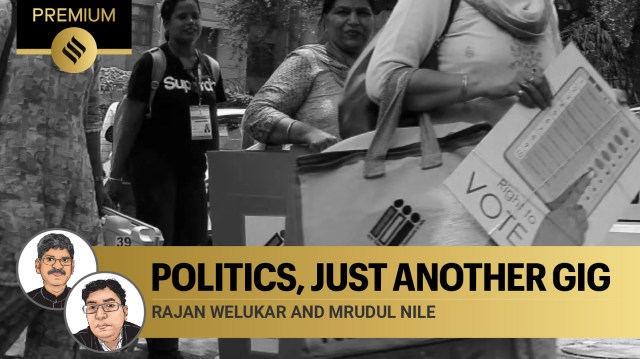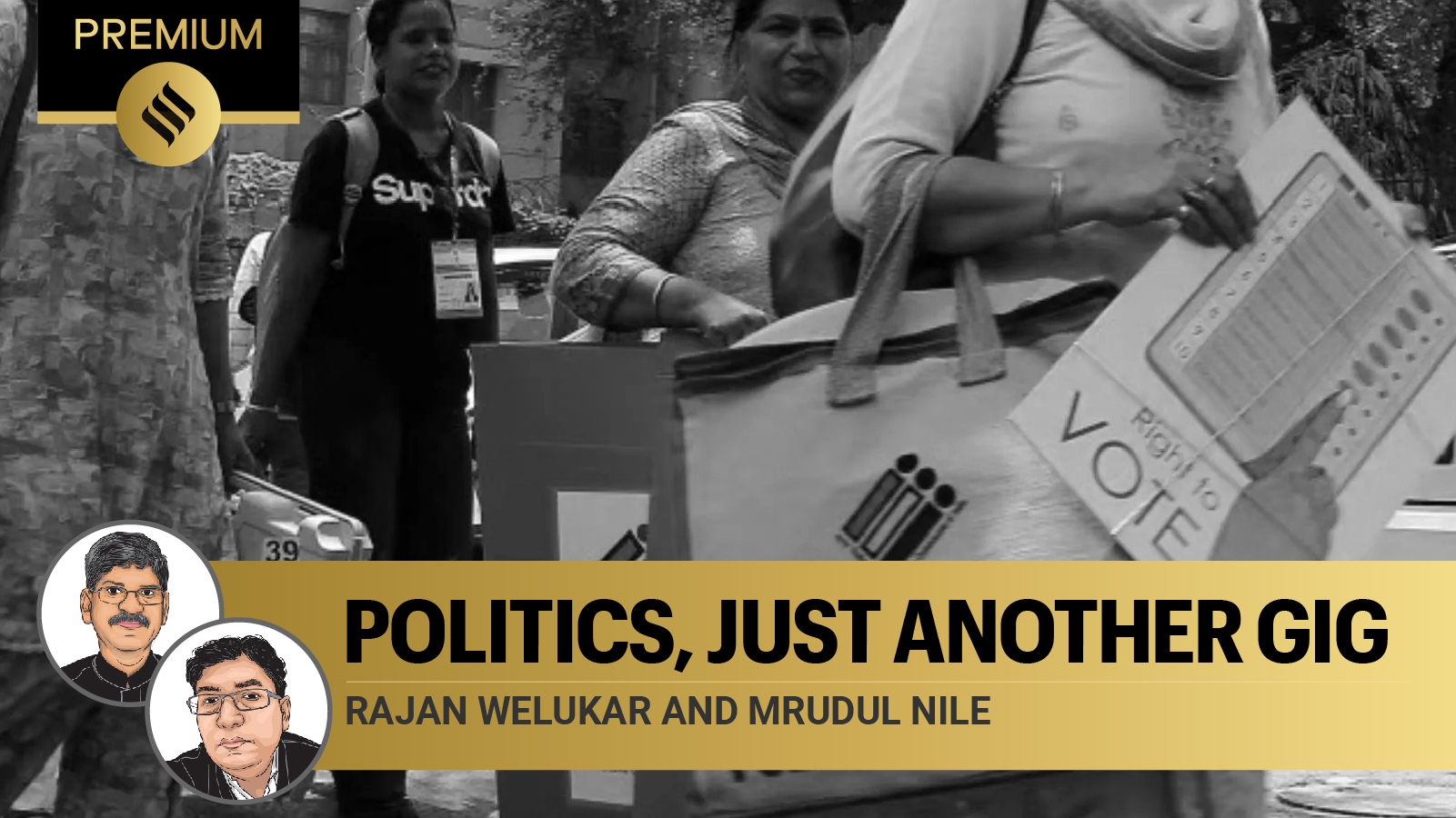
Nov 19, 2024 07:44 IST First published on: Nov 19, 2024 at 04:20 IST
The term “gig” is typically associated with economics, specifically with workers in the unorganised sector. It refers to the nature of work arrangements — temporary, contract-based, where the relationship between the worker and the employer is defined by short-term needs rather than long-term commitments. This concept of a “gig” economy has a striking parallel in the current political landscape of Maharashtra, where temporary alliances and shifting loyalties have become prevalent. Here, politicians seem to operate like gig workers, prioritising short-term gains over long-term ideological commitments.
The first significant instance of this “gig” phenomenon in Maharashtra politics occurred in June 2020, when the Shiv Sena split. A faction of 39 MLAs, led by Eknath Shinde, rebelled against Uddhav Thackeray. With the support of the BJP, they formed a new government, and Shinde assumed the chief ministerial role. This shift was justified as a “natural alliance,” invoking ideological continuity to maintain the party’s traditional voter base, despite the apparent opportunism behind the move. The second major split took place on July 2, 2023, within the Nationalist Congress Party (NCP). Ajit Pawar led a breakaway faction, taking the party symbol and name with him. Although this realignment could not be framed as a “divine alliance,” a senior BJP leader quickly declared that Ajit Pawar’s entry into the coalition marked the beginning of a “progressive Maharashtra”. This claim, however, appeared more like a political formula designed to provide a veneer of ideological justification for what was essentially a strategic power play.
In both cases, the centrality of the electorate was overlooked. Most discussions have focused on the constitutional implications of these splits, particularly regarding the recognition of political parties under the Tenth Schedule, and the morality of such factionalism. However, the real issue lies in the potential loss of value for voters who expect elections to be ideological contests grounded in policy frameworks.
In democracies like the US and the UK, electoral contests revolve around clear ideological divides — Democrats vs. Republicans, Conservatives vs. Labour. In contrast, the political flux in Maharashtra has created an ideological vacuum, resulting in dysfunctional political socialisation and the erosion of the state’s political culture. The absence of strong ideological stances undermines the voters’ ability to make informed choices, instead leaving them to navigate a landscape dominated by temporary alliances and shifting loyalties.
The emergence of the “gig-political worker” has further exacerbated the erosion of public trust. Political figures today often migrate from one party to another, not out of loyalty to their constituency or ideological alignment, but rather for personal gain and political expediency. In Maharashtra, we have witnessed the spectacle of two factions of the same party advocating for different ideologies within a short span of time. This trend, if it continues, could become a national phenomenon, raising serious questions about the fate of public trust.
Democratic consent is built on shared values and the socialisation of people into democratic norms. Democracy is not merely about majority rule; it requires political parties that contest elections based on distinct ideological and policy stances. If candidates lacked clear party affiliations or ideological commitments, voters would be left without a meaningful framework to assess their choices. The fact that independent candidates rarely win elections is evidence of this reality — voters prefer representatives who embody specific ideological and policy positions.
Despite the emergence of a dominant two-party competition nationally, regional parties continue to play a vital role in India’s political landscape. These parties often act as agents of change, shaping individual behaviour and political culture. However, the recent splits within Shiv Sena and NCP indicate a troubling trend of ideological compromise. Leaders who switch allegiances do so, not for ideological reasons but for personal advantages, undermining their party’s integrity.
The first phase of converting leaders into gig politicians involves an ideological compromise. This compromise, while difficult to quantify, is evident in the way leaders abandon long-standing policy positions for immediate gains. Such actions contribute to a broader process of depoliticisation, where ideological frameworks — like the progressive values championed by Phule, Shahu, and Ambedkar — no longer guide political decisions.
Depoliticisation refers to the process by which political issues lose their ideological context, reducing the space for meaningful political debate. In Maharashtra, the erosion of the progressive ideological framework has led to a weakening of political culture and a decline in the quality of democratic engagement. Without a clear ideological basis, political parties become mere vehicles for power, devoid of the vision needed for public life.
In this depoliticised environment, voters are left to navigate a political landscape where identity and loyalty are fluid, and policy considerations are secondary. The shift towards gig politicians — politicians without a stable ideological foundation — threatens to defenestrate the core values of democracy, leaving behind a hollowed-out political system driven by personal ambition and short-term gains.
most read
The rise of gig politics in Maharashtra signals a deeper crisis in the state’s political culture. As leaders abandon ideological commitments for opportunistic alliances, they undermine the very foundations of representative democracy. The electorate, caught in the crossfire of factionalism and shifting loyalties, faces a diminished political landscape where ideological clarity and policy-driven debate are increasingly rare.
To preserve the integrity of our democratic system, it is essential to reaffirm the importance of ideological commitments and policy-driven politics. Without a return to these core principles, the erosion of political culture will continue, leading to a further decline in public trust and democratic engagement.
Welukar is a retired academic and Nile is a Professor at the University of Mumbai


